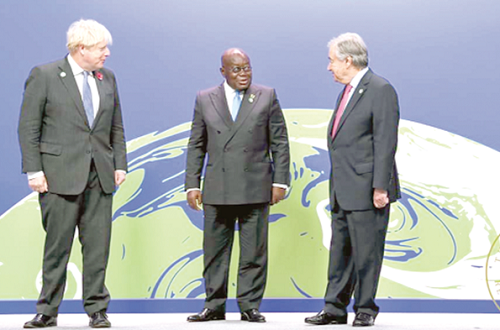
Climate Destiny: Will COP26 cost Africa’s industrialisation?
African nations at the just ended COP26 climate summit in Glasgow, Scotland, have criticised rich countries for failing to meet their promise of giving billions of dollars to help them cope with climate change.
It was a rare show of unity of purpose and a strong united voice from African leaders on such a huge international platform.
Advertisement
Western countries that are seen as the most advanced had to rely heavily on fossil fuels to industrialise. It, therefore, stands to reason that if rich nations are asking emerging economies to curtail reliance on fossil fuels for their industrialisation, then the rich nations need to commit more so African leaders can meet their commitments to build schools, hospitals, roads and other forms of infrastructure for their people whose revenue will have otherwise come from the chimneys of factories the West is asking Africa to scale down on.
The cost-benefit analysis of Africa giving up fossil fuels at such an infantile stage of our industrialisation as a continent raises a lot of questions.
The world’s wealthiest nations — the G-20 — account for 80 per cent of greenhouse gas emissions. However, scientists say poorer countries, particularly in Africa, are suffering the worst effects of climate change.
Rich nations pledged in 2009 to give developing countries $100 billion a year to help them deal with climate change, but the target date was pushed back to 2023 at the beginning of the COP26 summit.
Summing up Africa’s disappointment, Ghana’s President and Chair of ECOWAS, Nana Addo Dankwa Akufo-Addo, did not mince words when he said: “Those same nations are, however, insisting that we abandon the opportunity for rapid development of our economies. That would be tantamount to enshrining in the global community inequality of the highest order.
“Frankly speaking, there is no dignity to a slow and painful death. You might as well bomb our islands instead of making us suffer, only to witness our slow and fateful demise.”
Modest commitment
COP26 President, Alok Sharma, announced $197 million in new funding for adaptation for Africa from the UK government. Of this amount, $27 million will support the Africa Adaptation Accelerated Programme upstream facility, to deliver technical assistance and a pipeline of bankable projects.
The package is expected to unlock almost $1.2 billion for climate adaptation in Africa. Sharma said there would be more to come.
United States (US) Secretary of State, Antony Blinken, also announced new funding for climate adaptation from the US government. He said the US President would work with the US Congress to dedicate $3 billion annually in adaptation finance by the year 2024.
This is the largest commitment ever made by the US to reduce the impact of climate change in nations most endangered by it around the world.
No common definition
There is no internationally agreed definition of the term ‘climate change’, which has resulted in differences in opinion on the issue. Climate change can refer to long-term changes in average weather conditions covering all changes in the climate system, including the drivers of change, the changes themselves and their effects; or can refer only to human-induced change in the climate system.
There is also no agreement on how to define the term ‘climate variability’. Climate has been in a constant state of change throughout the earth’s 4.5-billion-year history, but most of these changes occur on astronomical or geological time scales, and are too slow to be observed on a human scale.
Danger to Africa
Climate change has been identified as a leading human and environmental crisis of the 21st century. The problem of understanding climate change (or global warming) is one of the major challenges confronting African people, their governments and the African Union (AU).
Moreover, it has been argued that climate change leads to acute conflicts and it, therefore, becomes imperative to achieve a proper understanding of the phenomenon in Africa.
Great public, political and academic attention is now being devoted to the issue of global warming and climate change. A broad scientific and political consensus has been established that climate change poses a considerable threat to Africa, its ecosystem and many of its species.
Empirical data from science has become more irrevocable than ever that climate change is happening. The evidence is all around us. And unless we act, we will see catastrophic consequences, including rising sea-levels, droughts and famine, and the loss of up to a third of the world’s plant and animal species with Africa bearing some of the brunt.
A large number of reports and public statements have also suggested that climate change in Africa is a security threat.
Way forward
African governments should make informed and transformational choices concerning climate change. This requires the best and most up-to-date science.
Climate information exists that could improve decision-making within these sectors, thereby mitigating the effects of adverse climate. But at present, this information is seldom incorporated in policy formulation processes and developmental decisions in some African capitals.
A recent study by the International Research Institute for Climate and Society (IRI) found gaps in four main areas: Integrating climate into policy; Integrating climate into practice; Climate services and Climate data.
IRI concluded that a major, continent-wide effort to integrate climate risk management into climate-sensitive development processes at all levels is an urgent and top priority requirement for Africa today.
In conclusion, the show of solidarity and a united voice by African leaders at COP26 is a breath of fresh air. When all is said, what gets done?
It is, therefore, time for Africa to invest in indigenous scientific research and proper African solutions to our climatic challenges. It is time for Africa to indeed take charge of its climate destiny.
The writer is an International Relations and Security Analyst



